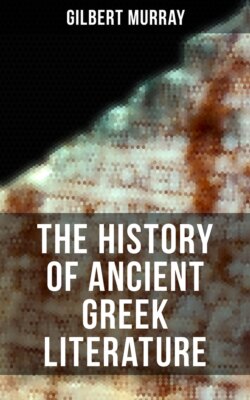The History of Ancient Greek Literature

Реклама. ООО «ЛитРес», ИНН: 7719571260.
Оглавление
Gilbert Murray. The History of Ancient Greek Literature
The History of Ancient Greek Literature
Table of Contents
PREFACE
I. HOMER
INTRODUCTORY
THE LEGENDARY POETS
THE HOMERIC POEMS
ILIAD AND ODYSSEY: THE PANATHENAIC RECITATION
THE EPIC LANGUAGE
THE SUBJECT-MATTER OF HOMER
CRITERIA OF AGE
II. LESSER HOMERIC POEMS; HESIOD; ORPHEUS
THE REJECTED EPICS
HYMNS OR PRELUDES
COMIC POEMS
HESIOD
ORPHEUS -- REVELATION AND MYSTICISM
III. THE DESCENDANTS OF HOMER, HESIOD, ORPHEUS
EPOS
ELEGY AND IAMBUS
IV. THE SONG
THE PERSONAL SONG -- SAPPHO, ALCÆUS, ANACREON
THE CHOIR-SONG -- GENERAL
THE EARLY MASTERS. ALCMAN
ARÎON
STÊSICHORUS
THE MIDDLE PERIOD. ÎBYCUS
SIMÔNIDES
TIMOCREON
BACCHYLIDES
THE FINAL DEVELOPMENT. PINDAR
V. THE BEGINNINGS OF PROSE
INSCRIPTIONS
'STORY'
CHRONICLES
'HISTORÊ' HECATÆUS
HÊRODÔRUS
THE EARLY 'HISTORIKOI' HELLANîCUS
VI. HERODOTUS
SON OF LYXES OF HALICARNASSUS (484 (?)-425 (?) B.C.)
VII. PHILOSOPHIC AND POLITICAL LITERATURE TO THE DEATH OF SOCRATES
EARLY PHILOSOPHY
THE ATHENIAN PERIOD OF PHILOSOPHY
OCCASIONAL WRITINGS
SOCRATES, SON OF SOPHRONISCUS FROM ALÔPEKÊ (468-399 B.C.)
VIII. THUCYDIDES
IX. THE DRAMA
INTRODUCTION
PHRYNICHUS, SON OF POLYPHRADMON (fl. 494 B.C.)
X. ÆSCHYLUS
ÆSCHYLUS, SON OF EUPHORION, FROM ELEUSIS (525-456 B.C.)
XI. SOPHOCLES
SOPHOCLES, SON OF SOPHILLOS, FROM COLONUS (496-406 B.C.)
XII. EURIPIDESM
EURIPIDES, SON OF MNESARCHIDES OR MNESARCHUSY, FROM PHLYA (ca. 480-406 B.C.)
XIII. COMEDY
BEFORE ARISTOPHANES
ARISTOPHANES, SON OF PHILIPPUS, FROM KYDATHENAION (ca. 45 B.C. to ca. 385 B.C.)
XIV. PLATO
PLATO, SON OF ARISTON, FROM KOLLŶTUS (427-347 B.C.)
XV. XENOPHON
XENOPHON, SON OF GRYLLUS, FROM ERCHIA (434-354 B.C.)
XVI. THE 'ORATORS'
GENERAL INTRODUCTION
LIVES OF THE ORATORS. Up to Isocrates
ISOCRATES, SON OF THEODÒRUS FROM ERCHIA (436-338 B.C.)
XVII. DEMOSTHENES AND HIS CONTEMPORARIES
DEMOSTHENES, SON OF DEMOSTHENES, FROM PAIANIA (383-322 B.C.)
XVIII. THE LATER LITERATURE, ALEXANDRIAN AND ROMAN
I. FROM THE DEATH OF DEMOSTHENES TO THE BATTLE OF ACTIUM
II. THE ROMAN AND BYZANTINE PERIODS
CHRONOLOGICAL TABLE
I. -- BEFORE THE SEVENTH CENTURY ALL THE DATES ARE MERELY LEGENDARY, AND THE POETS MAINLY FABULOUS. II. -- BEFORE MARATHON
III. -- THE ATTIC PERIOD
Отрывок из книги
Gilbert Murray
Published by
.....
There are many exceptions to these rules. Dr. Fick of Göttingen, who has translated all the 'older parts' of Homer back to a supposed original Æolic, leaving what will not transcribe as either late or spurious, has found himself obliged to be inconsistent in his method; when Fιδέσθαι occurs without a F he sometimes counts it as evidence of lateness, sometimes alters it into íκέσΘαι. In the same way a contraction like νικωντεσ may represent an Æolic νíκανς from νίκαμὶ, or may be a staring Atticism. When we see further that, besides the Ionisms which refuse to move, there are numbers of Æolisms which need never have been kept for any reason of metre, the conclusion is that the Ionising of the poems is not the result of a deliberate act on the part of a particular Ionic bard -- Fick gives it boldly to Kynæthus of Chios -- but part of that gradual semi-conscious modernising and re-forming to which all saga-poetry is subject. The same process can be traced in the various dialectic versions of the Nibelungenlied and the Chanson de Roland. A good instance of it occurs in the English ballad of Sir Degrevant, where the hero 'Agravain' has not only had a D put before his name, but sometimes rhymes with 'retenaunce' or 'chaunce' and sometimes with 'recreaunt' or 'avaunt.' It comes from an AngloNorman original, in which the Sieur d'Agrivauns formed his accusative d'Agrivaunt.14
The evidence of language is incomplete without some consideration of the matter of the poems. What nationality, for instance, would naturally be interested in the subject of the Iliad? The scene is in the Troad, on Æolic ground. The hero is Achilles, from Æolic Thessaly. The chief king is Agamemnon, ancestor of the kings of Æolic Kymê. Other heroes come from Northern and Central Greece, from Crete and from Lycia. The Ionians are represented only by Nestor, a hero of the second rank, who is not necessary to the plot.
.....